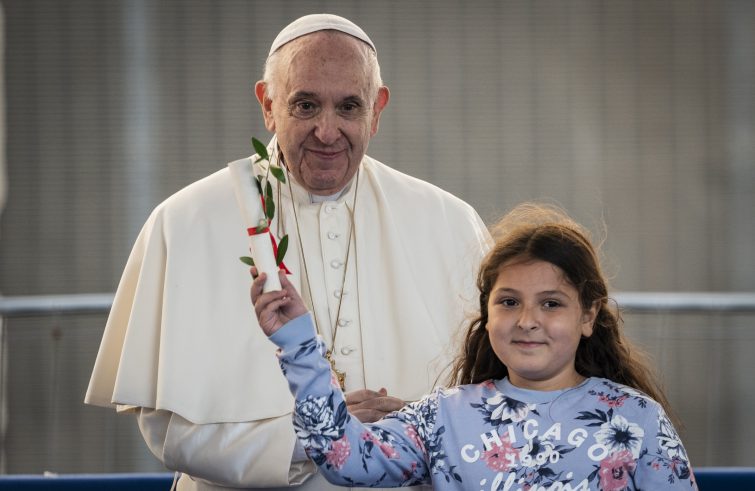
Dialogue between generations, education and labour: these are three paths for “making possible the creation of a social covenant, without which every project of peace turns out to be insubstantial.” The Pope writes in his Message for the World Day of Peace, celebrated next January 1st .“Despite numerous efforts aimed at constructive dialogue between nations, the deafening noise of war and conflict is intensifying. While diseases of pandemic proportions are spreading, the effects of climate change and environmental degradation are worsening, the tragedy of hunger and thirst is increasing, and an economic model based on individualism rather than on solidarity sharing continues to prevail”, is the first picture outlined by Francis, for whom
“we can speak of an ‘architecture’ of peace, to which different institutions of society contribute, and an “art” of peace that directly involves each one of us.” “All can work together to build a more peaceful world”, the Pope’s first appeal: “starting from the hearts of individuals and relationships in the family, then within society and with the environment, and all the way up to relationships between peoples and nations.”
“Between selfish indifference and violent protest there is always another possible option: that of dialogue”: the recipe to overcome the pandemic, constituting an “indeed painful crisis”, but “it has also helped to bring out the best in people”, as testified by “generous examples of compassion, sharing and solidarity” in every part of the world. “Dialogue entails listening to one another, sharing different views, coming to agreement and walking together”, underlines the Pope , returning on a theme he has at heart: “Great social challenges and peace processes necessarily call for dialogue between the keepers of memory – the elderly – and those who move history forward – the young –. Each must be willing to make room for others and not to insist on monopolizing the entire scene by pursuing their own immediate interests, as if there were no past and future.” Dialogue between generations, writes Francis , “are the driving force behind
a healthy politics that is not content to manage the present ‘with piecemeal solutions or quick fixes’, but views itself as an outstanding form of love for others, in the search for shared and sustainable projects for the future.”
“Without roots, how can trees grow and bear fruit?”, Francis said, addressing the theme of the care of our common home. The Pope hence encouraged “all those young people who work for a more just world, one that is careful to safeguard the creation entrusted to our stewardship.”
“It is high time that governments develop economic policies aimed at inverting the proportion of public funds spent on education and on weaponry.” In his Message the Holy Father reiterates that “pursuit of a genuine process of international disarmament can only prove beneficial for the development of peoples and nations, freeing up financial resources better used for health care, schools, infrastructure, care of the land and so forth.”
“In recent years, there has been a significant reduction worldwide in funding for education and training; these have been seen more as expenditures than investments”, Francis denounced: “Military expenditures, on the other hand, have increased beyond the levels at the end of the Cold War and they seem certain to grow exorbitantly.”
To reverse course “it is essential to forge a new cultural paradigm through a global pact on education for and with future generations, one that commits families, communities, schools, universities, institutions, religions, governments and the entire human family to the training of mature men and women.” “A compact that can promote education in integral ecology, according to a cultural model of peace, development and sustainability centred on fraternity and the covenant between human beings and the environment”, the Pope added. The final part of the message is devoted to the challenge of labour, further aggravated by the COVID-19 pandemic: “Millions of economic and productive activities have failed; short-term workers are increasingly vulnerable; many of those who provide essential services have an even lower public and political profile; and in many cases, distance teaching has led to a deficit in learning and delays in completing programmes of study.” Not to mention the “bleak prospects” faced by young people entering the job market and recently unemployed adults.
“In a particular way, the impact of the crisis on the informal economy, which often involves migrant workers, has been devastating”,
Francis denounces: “Many of the latter are not even recognized by national legislation; it is as though they did not exist. They and their families live in highly precarious conditions, prey to various forms of slavery and with no system of welfare to protect them.” “It is more urgent than ever to promote, throughout our world, decent and dignified working conditions, oriented to the common good and to the safeguarding of creation”, Francis’ appeal: regarding this aspect, for the Pope, “politics is called to play an active role by promoting a fair balance between economic freedom and social justice. All who work in this field, starting with Catholic workers and entrepreneurs, can find sure guidelines in the Church’s social doctrine.”











